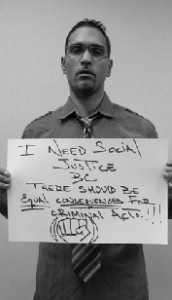Professors from Adelphi University's School of Social Work created a forum for students to talk about social injustices happening today.
by Leslie Hunter-Gadsden, M.A. ’01
How to bring the issues of racial inequality and police brutality to the classroom? Create a dialogue and have students follow through.In 2014 the lack of indictments in legal decisions related to the deaths of Michael Brown in  Ferguson, Missouri, and Eric Garner in Staten Island, New York, led to frustration, sadness and confusion for many Americans. Nationwide response, both on and off college campuses, included rallies stressing that “black lives matter” as well as questions about racial inequality and a system of justice that often has very different outcomes for citizens of color than the rest of the American population.
Ferguson, Missouri, and Eric Garner in Staten Island, New York, led to frustration, sadness and confusion for many Americans. Nationwide response, both on and off college campuses, included rallies stressing that “black lives matter” as well as questions about racial inequality and a system of justice that often has very different outcomes for citizens of color than the rest of the American population.
In late November 2014, Adelphi University School of Social Work Associate Professor CarolAnn Daniel, Ph.D., and Assistant Professor Laura Quiros, Ph.D., wanted to create a forum for students and faculty members to have a dialogue about the events in Ferguson and Staten Island and what implications they had for social work.
“The sense of grief and outrage was palpable, and we couldn’t ignore it,” Dr. Daniel said. “The primary ethic of social work is to seek justice. Part of our aim was to have students express themselves, but also look at how they could effect social change. Many of the people that receive services from social workers are on the front lines of this kind of terror and are marginalized and often brutalized on a daily basis. And many of our students are affected in much the same way their clients are.”
While white students do not fit the profile of “black male suspect,” they are lacking if they are not at least aware of the struggles many citizens of color face. “Race can’t be a taboo topic,” Dr. Quiros said. “It needs to be transparent in our dialogue, which is why so much of this work is about self-reflection and understanding what stops us from discussing the implications of race in America.”
Creating a space where students feel safe to discuss a variety of issues is a key professional mandate for the School of Social Work. With the support of Associate Dean Bradley Zodikoff, Ph.D, and Dean Andrew Safyer, Ph.D., Drs. Daniel and Quiros, who are also co-chairs of the Student Experience Committee, asked fellow faculty on all four campuses—Garden City, Manhattan, Hauppauge and Hudson Valley—to allot an hour between regular classes in December 2014 for students to engage in a series of dialogues.
Dr. Daniel noted that students varied widely in terms of their reactions to the ramifications of the deaths of Michael Brown and Eric Garner. “Some of the white students were involved in victim blaming, while others seemed to wonder why we were having the dialogues,” she said, explaining that what was eye-opening was when students of color told of their personal experiences, or those of relatives, who were stopped by police.
Listening to the interchange was a moving experience for Dr. Daniel. “There can’t be healing without justice and we can’t heal or get justice without unveiling—even if it is uncomfortable.”
Brian Valentine, 37, is a graduate student transitioning from a career in finance to one in social work. He attended two of the dialogues, because “the issues were important to me as an African American male.” He feels that being knowledgeable about the events in Ferguson and Staten Island are “part of the curriculum of social competence for all students. Some students were at the dialogues to vent and some were there to learn.”
Valentine said that part of that learning curve means not only being aware of instances of questionable police responses when dealing with citizens of color, but also looking for ways to change policing policies to improve law enforcement in the long run. “Even if a citizen does something wrong, there should be a system of justice. It shouldn’t be a case of petty crime equals death,” he said.
Both Drs. Quiros and Daniel plan to keep this issue on the front burner for students to continue to discuss and address. Undergraduate and graduate students in the School of Social Work Garden City and Manhattan campuses began a Social Justice Photo Project during the Spring 2015 semester. Each student was asked to create a sign stating why they needed social justice, and then hold up the sign in a self-portrait. “The plan is to unveil the project in the early Fall 2015 semester and have a reception to let the students talk about their experiences participating in the project,” Dr. Daniel said, adding that the Hudson Valley and Hauppauge campuses produced banners with students signing sections and stating why they needed justice.
In June, Dr. Quiros, with the support of the School, convened a diverse group of faculty, graduate and doctoral students to share their thoughts and emotions on the murder of nine members of the Emanuel African Methodist Episcopal Church in Charleston, South Carolina. Dr. Daniel said that the School is planning a one-day conference during the Fall 2015 semester when full-time faculty, adjunct faculty and other staff members will look at institutional bias, racism and the ways in which injustice goes unrecognized and unopposed in institutions. The School of Social Work will continue to collaborate with other on-campus groups through the Social Justice Alliance. Dr. Daniel affirmed, “We are part of the system, and we also need to be part of the change.”
This article appeared in Impact, the School of Social Work Newsletter.